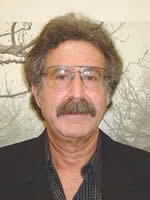 Edward I. Solomon grew up in North Miami Beach, Florida, received his PhD at Princeton (1972) and was a postdoctoral fellow at The Orsted Institute in Denmark and at Caltech. He started his career at MIT in late 1975, became a full professor in 1981, and joined the faculty at Stanford in 1982 where he is now the Monroe E. Spaght Professor of Humanities and Sciences. He has been a visiting professor in France, Argentina, Japan, China and India. He has received the ACS Awards in Inorganic Chemistry and Distinguished Service in the Advancement of Inorganic Chemistry. Other awards include the Ira Remsen Award, the Centenary Medal from the RSC, the Wheland Medal from the University of Chicago, the Frontiers in Biological Chemistry Award from the MPI, and the Chakravorty Award from the Chemical Research Society of India. He is a member of the National Academy of Sciences, the American Academy of Arts and Sciences and a Fellow in AAAS.
Edward I. Solomon grew up in North Miami Beach, Florida, received his PhD at Princeton (1972) and was a postdoctoral fellow at The Orsted Institute in Denmark and at Caltech. He started his career at MIT in late 1975, became a full professor in 1981, and joined the faculty at Stanford in 1982 where he is now the Monroe E. Spaght Professor of Humanities and Sciences. He has been a visiting professor in France, Argentina, Japan, China and India. He has received the ACS Awards in Inorganic Chemistry and Distinguished Service in the Advancement of Inorganic Chemistry. Other awards include the Ira Remsen Award, the Centenary Medal from the RSC, the Wheland Medal from the University of Chicago, the Frontiers in Biological Chemistry Award from the MPI, and the Chakravorty Award from the Chemical Research Society of India. He is a member of the National Academy of Sciences, the American Academy of Arts and Sciences and a Fellow in AAAS.
Professor Solomon's research is in the fields of Physical-Inorganic, Bioinorganic, and Theoretical-Inorganic Chemistry. His focus is on spectroscopic elucidation of the electronic structure of transition metal complexes and its contribution to reactivity. He has made significant contributions to our understanding of metal sites involved in electron transfer, copper sites involved in O2 binding, activation and reduction to water, and in structure/function correlations over non-heme iron enzymes.